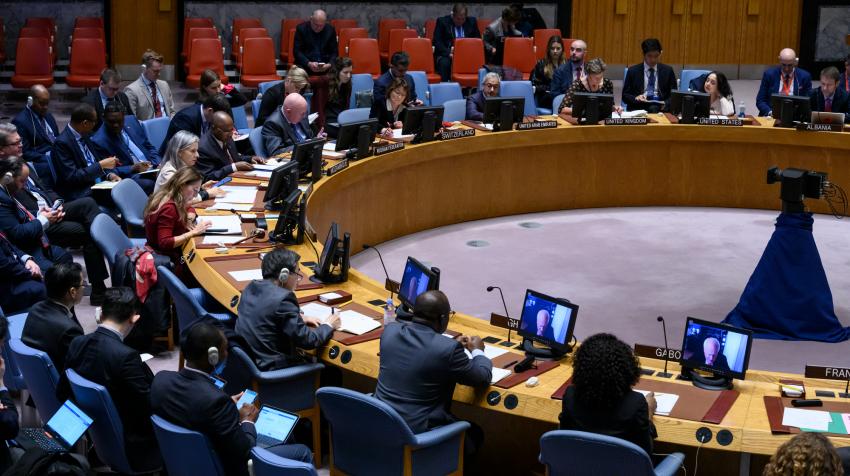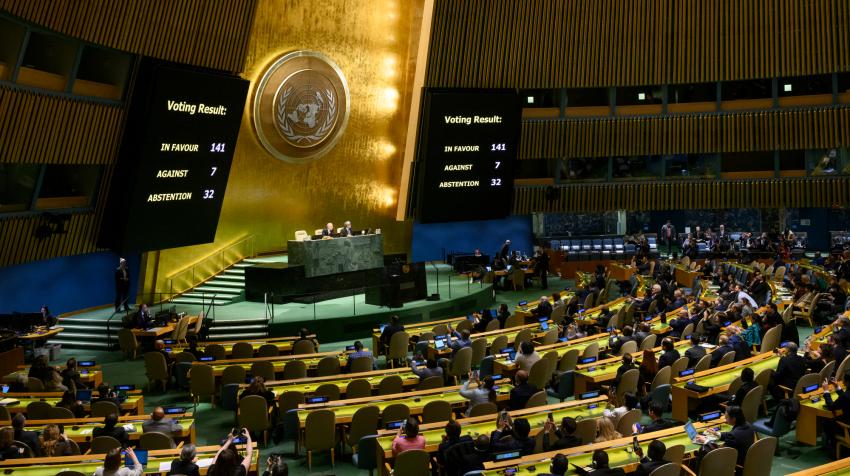18 May 2023
The period since the beginning of Russia’s all-out war on Ukraine in February 2022 has been a testing time for the United Nations Security Council and General Assembly. Both bodies have witnessed many angry debates. But both have also demonstrated some resilience during the crisis, and shown how multilateral forums can mitigate the consequences of major conflicts.
Despite profound differences over Ukraine, the permanent members of the Security Council have used the body as a channel for diplomatic cooperation on other crises. In the space of the last fifteen months, the Council has even managed to innovate on a number of files, authorizing a new sanctions regime targeting gangs in Haiti and passing its first resolution on the conflict in Myanmar. Council members have been slow to respond to some crises and are struggling with challenges such as the rise of jihadist violence in the Sahel. Nonetheless, the Council has proven to be a space where some major-power cooperation remains possible.
This is in part because the Council's five permanent members view the work of the United Nations as supporting their national interests. They also remain united by the common aim of retaining the Council as an institution in which they have established advantages in decision-making. Equally, the elected members of the Council have shown a high level of unity in trying to continue diplomacy on efforts such as the delivery of humanitarian aid to Syria, which are important to the Council’s reputation.
These factors have meant that all sides retain an interest in reaching agreements through the Security Council that might be impossible to achieve and legitimize in bilateral talks. The body remains vastly more active than it had been through long stretches of the cold war; it is worth remembering that the Council only managed to pass one resolution in the entirety of 1959. But it is in some ways playing the role that it served during that previous period of entrenched international tension, as a space where the major powers can make selective compromises on crises.
The General Assembly, meanwhile, has emerged as a forum where States can make important statements of principle about the war in Ukraine, affirming Kyiv’s sovereignty and, in a February 2023 resolution, outlining the parameters for a just, lasting and comprehensive peace. The Assembly has not, however, established a comparable, direct role in resolving the conflict. It has not, for example, recommended the appointment of a United Nations envoy—as it did in the case of the war in Syria in 2012—or other potential mechanisms that could help bring the war in Ukraine to a halt.

This is primarily because, to date, there has been no political opening or pathway for a United Nations-based push to end the war. The Secretary-General, who has played a significant role in diplomacy around the Black Sea Grain Initiative and other efforts to manage the fallout of the war, has to date discouraged talk of a mediated solution. Nonetheless, some General Assembly members feel that the body should aspire to a greater role in conflict resolution.
Historically, the Assembly has played a large role in peace and security in periods when the Security Council is severely divided. Assembly members mandated the first full-scale United Nations peacekeeping force in Suez in 1956 and threw the body’s weight behind the struggle against apartheid in South Africa during the later cold war, in both cases side-stepping tensions within the Council.
The General Assembly was often very ambitious in its proposals. Rebecca Barber, an expert on the body, notes that in resolution 2107 (XX) of 21 December 1965, it responded to the refusal by Portugal to free its African colonies by urging United Nations members to “break off diplomatic relations with Portugal; close their ports to Portuguese vessels; prohibit their ships from entering Portuguese ports; refuse landing and transit facilities to Portuguese Government aircraft; and boycott trade with Portugal.”
It is not clear that current members of the Assembly want to play such an active role in dealing with many of today’s controversies and conflicts. When the body debated the 2021 coup in Myanmar, it took months to come up with a recommendation for an arms embargo, which had little observable impact. Nonetheless, many United Nations members share a sense that, given current geopolitical uncertainties, the General Assembly should explore its options for dealing with future crises. The Assembly took a significant step in this direction in April 2022 when it approved an initiative—initially floated by Liechtenstein—calling on the permanent members of the Security Council to explain their vetoes to the full Assembly within ten days of casting them.

Diplomats in New York are now asking how they can build on this initiative. Options could include the General Assembly making recommendations to the Security Council on crisis response in the wake of a veto, or recommending specific actions, such as the appointment of envoys or establishment of special political missions, in cases where Council members cannot agree.
One obstacle to enacting ideas of this type is that few serving United Nations diplomats are aware of the range of tools that the General Assembly has deployed in the past, or how to put them into action. In recent discussions with diplomats focusing on Assembly affairs, I have come to think it would be useful for the President of the General Assembly to develop an accessible handbook outlining when, why and how the body can engage in conflict resolution activities.
A handbook would not, of course, generate political will among Assembly members to act in future crises; that would always depend on the specific circumstances of any given case. But extra information on the body’s options could at least facilitate better debates in New York.
Overall, recent experiences have shown that the Security Council and General Assembly still have the capacity to frame how States respond to major crises—and how to limit their global consequences. This still falls far short of the ambitions of the Charter of the United Nations, but it does at least suggest that multilateral cooperation has an enduring role to play in reducing global threats.
The UN Chronicle is not an official record. It is privileged to host senior United Nations officials as well as distinguished contributors from outside the United Nations system whose views are not necessarily those of the United Nations. Similarly, the boundaries and names shown, and the designations used, in maps or articles do not necessarily imply endorsement or acceptance by the United Nations.




